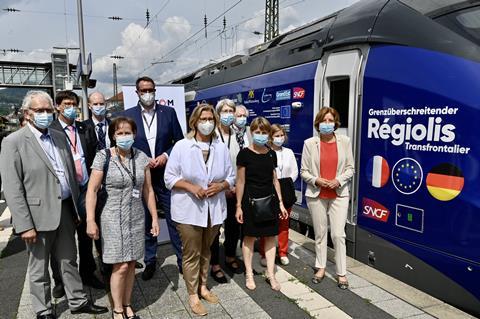
FRANCE: The first of 30 electro-diesel trainsets for cross-border services between the French region of Grand Est and the German Länder of Baden-Württemberg, Rheinland-Pfalz and Saarland was demonstrated to local politicians and officials in Neustadt an der Weinstrasse on July 10.
An identical trainset is meanwhile being tested at Velim in the Czech Republic with a view to the fleet entering commercial service from December 2024.
The four-car trains are designed to accept power at 15 kV 16∙7 Hz and 25 kV 50 Hz and will be able to run at 160 km/h. Each set includes a first class saloon and space for cycles as well as toilets meeting the latest PRM accessibility regulations.
Grand Est is investing €376m in the fleet and plans to use the trains on seven cross-border routes totalling 451 km from 2025. These are Metz – Saarbrücken; Metz – Trier; Strasbourg – Saarbrücken; Strasbourg – Wörth am Rhein – Karlsruhe; Strasbourg – Neustadt an der Weinstrasse; Strasbourg – Offenburg; and Mulhouse – Müllheim. A tender for the operation of these services is envisaged in 2022.
The fleet is to be maintained at a depot to be built on the site of a freight terminal at Strasbourg-Cronenbourg.
The Régiolis sets are part of Alstom’s Coradia Polyvalent family and are being assembled at the Reichshoffen plant which the company is obliged to divest under the terms of its agreement to take over Bombardier Transportation.
Grand Est described the Régiolis order as helping to maintain economic activity and employment at the Reichshoffen site. Alstom announced in April that the plant had been chosen to assemble a fleet of bimode hydrogen-fuelled trainsets for Grand Est, Auvergne-Rhône-Alpes, Bourgogne-Franche-Comté and Occitanie.
A €3m contribution towards the cost of the Régiolis Grand Est order has been made available under the EU-funded Interreg Rhin Supérieur programme.

















